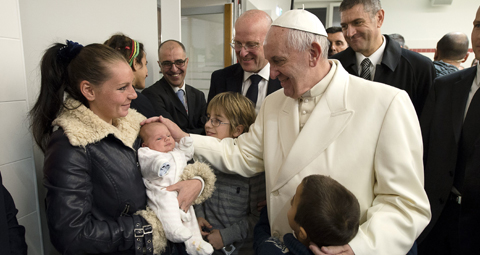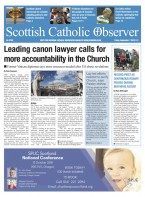June 2 | ![]() 0 COMMENTS
0 COMMENTS ![]() print
print

Let us never neglect the powerless
Changes in his street prompt ROSS AHLFELD to reflect on the wider world and the need for kindness
OFTEN it can be difficult for us to adjust to change; lately, my own wee street has changed quite drastically, with two elderly neighbours a few doors down, who had lived in the street all their lives, sadly passing away. A lovely retired couple, both of whom had been quite ill, who lived across the street have also recently moved away, as well as a neighbour with disabilities, who we were very fond of, now moving into sheltered accommodation. We will miss all these good neighbours very much.
My wife and the other neighbours often looked in on the older folks and especially the lady with additional support needs. Now that they are all gone, it feels as if we’ve suddenly lost a big part of our community. Or in other words, we needed them and they needed us.
I’m ashamed to say that too often I only see the true value of individuals who society would deem to be ‘powerless’ after they are no longer in my life. And this is despite the fact that the downward path of Jesus is the way of powerlessness.
I guess this is because it’s sometimes hard for us to see that any good can come from people who are powerless. In a highly ambitious society of so-called winners and losers, we praise the competitive world of free market capitalism. In doing so we fail to recognise that the very best moments of our lives and our worth as human beings can be found in everyday encounters within our streets.
More so, our street isn’t unusual: hidden works of mercy take place in streets and in communities all across Scotland every single day with small team of friends and neighbours carrying out semi-organised acts of neighbourly kindness. Worryingly, these informal voluntary works are becoming increasingly vital as our formal systems of health and social care continue to face funding cuts and are subsequently stretched to breaking point.
However, these changes in my street have helped me to better apprehend Henri Nouwen’s encouragement to us, to fully understand that it is the weakest among us who create community.
Mr Nouwen points out that it is often the elderly and those with disabilities who bring us together. It is their needs and their vulnerability which draws us all towards a true community. It’s what Mr Nouwen describes as ‘downward mobility.’ He goes on to point out that it is through powerlessness that we can enter into solidarity with our fellow human beings, form a community with the weak, and thus reveal the healing, guiding, and sustaining mercy of God.
Recently, I was reminded again of downward mobility and the importance of community while re-reading the 1952 biography of Dorothy Day, The Long Loneliness, and a paragraph I hadn’t previously noticed jumped out at me.
It reads: “And yet I do know that if any bishop or archbishop started to take the poor into his palace, or moved out of his palace to live with the poor, he would be considered mad, and he would suffer the fate of the fool,” it reads. “Bishops and priests may long to make that gesture, but their own humility no doubt restrains them. Some day may God put His hand upon them so unmistakably that they know they are called to this gesture, to this madness.”
I wonder if we might say that Dorothy Day’s yearning has now been fulfilled by our current Pope since he does not live in the opulent Apostolic Palace, but instead resides in a much simpler room in a Vatican guesthouse so as to be able to ‘live in community with others.’
There are also rumours about Pope Francis sneaking out of the Vatican during the night dressed as a simple priest, visiting and comforting the homeless of Rome. It’s also said that he is directly helping the Holy See’s aid teams with the distribution of food, clothes and funds.
So, perhaps Dorothy Day’s vision has indeed become a reality, or perhaps not, but what we can say for certain is that even the Supreme Pontiff has a need to serve and to live among those who the world might deem to be his ‘inferiors.’ We can also say for certainty that this Papacy contrasts strongly with the cultural push for ‘upward mobility.’
Yet, downward mobility is not limited only to our neighbourhoods. Rather, the spirit of radical hospitality also extends into our care homes, hospitals and even our prisons.
For example, some of our Glasgow Catholic Workers have recently started to get involved in prison visits. Such work is in keeping with the work of our spiritual forebears all the way back to the Beghards and the Beguine Christian mystic Mechtild of Magdeburg. Mechtild commends us to care for the friend, the enemy, the stranger, the broken and the prisoner in equal measure because this is what the justice of Jesus Christ and the holy compassion of God demands of us.
In reality, our ministry and our vocation is carried out wherever we are now, a lesson I’ve learned from and seen lived out by the good people within the Community of the Risen Christ in Clarkston.
This is a community of love which builds peace in the home, among the family and grows it out into the community and even further, spread out in to the world.
Despite this, we all sometimes yearn to be somewhere else, or even to have another life rather than the one we have. Our own weakness and vulnerability causes us to constantly compare ourselves to those who we think are better off than us, or smarter or living better lives.
Unsurprisingly, these comparisons don’t make us feel so good. Instead they make us feel like failures and they make us feel inadequate. Therefore, it’s vital that we always remember that our own personal vocation is found where we are and in who we are right now. We are all very different people, each with a special call in life which is totally unique from everyone else’s vocation.
Before he was killed, Archbishop Oscar Romero said: “Nobody can do everything but everyone can do something.” Fr Dan Berrigan later expanded on this idea when he said: “All you have to do is make your story fit into Jesus’ story.”
Blessed are the peacemakers in the war zones and in the Third World and blessed are the peacemakers right here in the streets and in the homes of every one of us.











